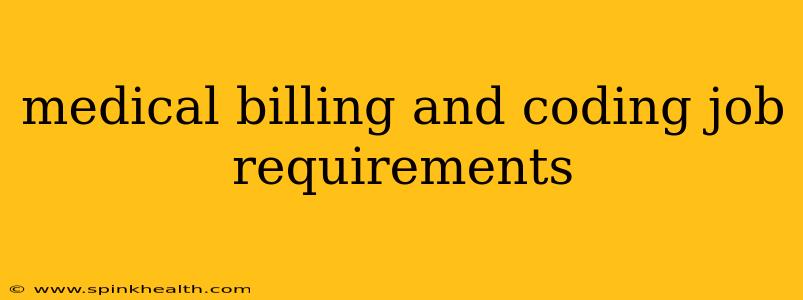Decoding the Mystery: Medical Billing and Coding Job Requirements
The world of healthcare is vast and complex, and within it lies the critical role of medical billing and coding specialists. These professionals are the unsung heroes, ensuring healthcare providers get paid for their services. But what exactly does it take to land one of these in-demand jobs? Let's unravel the mystery surrounding medical billing and coding job requirements.
My journey into the world of medical billing and coding began with a fascination for the intricate details of healthcare finance. I spent years immersed in the industry, witnessing firsthand the challenges and rewards of this critical field. This article draws on that experience, supplemented with extensive research, to provide a comprehensive guide to the job requirements.
What are the essential job duties of a medical billing and coding specialist?
This isn't just about numbers; it's about accuracy and efficiency. A typical day might involve:
- Assigning codes: Using the latest versions of the ICD (International Classification of Diseases) and CPT (Current Procedural Terminology) codes to accurately reflect the services provided by physicians. This demands a keen eye for detail and a thorough understanding of medical terminology. Think of it as translating doctor's notes into a universal language for insurance companies.
- Preparing claims: Ensuring that all necessary information is included in the claim forms to be submitted to insurance providers. This includes patient demographics, diagnosis codes, procedure codes, and any relevant supporting documentation. One misplaced comma can delay or even prevent payment!
- Following up on claims: Tracking the status of submitted claims, identifying any issues or denials, and taking the necessary steps to resolve them. This often involves interacting with insurance companies and resolving discrepancies. Think of it as being a detective for unpaid claims.
- Maintaining patient records: Keeping accurate and organized patient records is essential for compliance and efficient billing. This also involves data entry, record keeping, and file management.
- Understanding insurance regulations: The healthcare industry is constantly evolving, with new regulations and guidelines impacting billing and coding practices. Staying up-to-date is crucial.
What educational requirements are typically needed for a medical billing and coding specialist?
While a four-year college degree isn't always mandatory, formal education is usually a must. This might include:
- Associate's degree: Many aspiring medical billers and coders opt for an Associate's degree in Medical Billing and Coding, Health Information Technology, or a related field. This provides a solid foundation in the necessary skills and knowledge.
- Certification: Obtaining certifications like the Certified Professional Coder (CPC) or Certified Professional Biller (CPB) demonstrates competence and increases job prospects. These credentials are highly valued by employers.
- Online programs and courses: Various online programs offer flexible and accessible training options for those seeking to enter the field. These programs often cover the essential aspects of medical billing and coding.
What skills and experience are usually required?
Beyond education, the following skills are crucial:
- Medical terminology knowledge: Understanding medical terms and abbreviations is non-negotiable. It's the language of the profession.
- ICD and CPT coding proficiency: Deep knowledge of the coding systems is essential for accurate claim preparation.
- Strong computer skills: Medical billing and coding involves significant computer work, including using billing software and electronic health records (EHR) systems.
- Attention to detail: Accuracy is paramount; a small mistake can have significant consequences.
- Analytical skills: The ability to analyze medical records and identify relevant information is crucial for efficient coding.
- Problem-solving skills: Dealing with claim denials and resolving billing issues requires excellent problem-solving abilities.
- Communication skills: Interacting with physicians, insurance companies, and patients often requires clear and professional communication.
What software proficiency is expected?
Employers often look for familiarity with specific software:
- Electronic Health Record (EHR) systems: Experience with common EHR systems like Epic, Cerner, or Meditech is highly beneficial.
- Medical billing software: Knowledge of various billing software packages is often a requirement.
What salary can I expect?
The salary for a medical billing and coding specialist can vary depending on experience, location, and employer. Researching salaries in your specific area is essential.
This detailed exploration of medical billing and coding job requirements should equip you with a comprehensive understanding of this vital healthcare profession. Remember, continuous learning and staying current with industry changes are critical for long-term success in this dynamic field. The journey might be challenging, but the rewards – both personal and professional – are significant.

